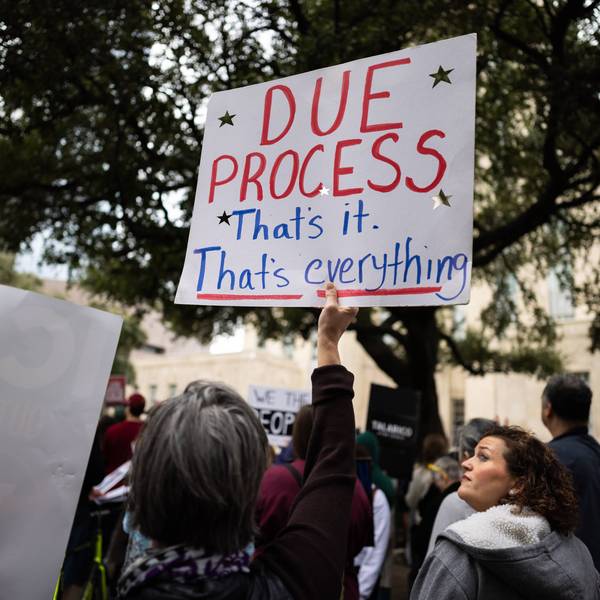This essay is part of the Brennan Center's series examining the punitive excess that has come to define America's criminal legal system.
To dismantle America's dehumanizing and racially skewed human caging system, we must eliminate mandatory minimums. Forget swinging the pendulum from tough-on-crime to leniency; it always swings back. Instead, we need a paradigm shift. A paradigm shift occurs in three phases: it starts with a dominant paradigm, moves through a crisis phase, and ends with "a revolutionary change in world-view" that constitutes a new dominant paradigm.
The principle that underlies mandatory minimums is dehumanization.
Currently, the dominant paradigm in the criminal legal system is the myth that imposing harsh mandatory minimum sentences and locking people of color in cages are necessary to keep white people safe. At the federal level alone, mandatory minimum penalties form the cornerstone of the human caging system. Prosecutors' use of mandatory minimums in over half of all federal cases disproportionately impacts poor people of color and has driven the exponential growth in the federal prison population in recent decades. All 50 states and DC also have mandatory minimum sentencing laws.
The principle that underlies mandatory minimums is dehumanization. As Isabel Wilkerson writes, our country's racial "caste system relies on dehumanization to lock the marginalized outside the norms of humanity so that any action against them is seen as reasonable." So many of the horrors Wilkerson catalogs in the "program of purposeful dehumanization" instituted by the Nazis and by the United States during chattel slavery have analogues in today's carceral state: anonymous uniforms replacing clothing, inmate numbers supplanting names, the shaving of heads, the roll calls. Racial disparities in the application of mandatory minimums are a particularly stark illustration of Wilkerson's thesis. Mandatory minimums dehumanize people by--in the words of Judge Stephanos Bibas--acting as "sledgehammers rather than scalpels," falling with equal force on people whose circumstances are dramatically different from one another and preventing judges from calibrating punishment to suit the person or the crime.
Over the past century, the mandatory minimums paradigm has moved through the second phase of a paradigm shift--the crisis phase--becoming the subject of dispute and controversy. Congress first enacted mandatory minimums for drug offenses in the early 20th century. But reformers pushed back, and by mid-century a rehabilitative sentencing model began to replace the punitive model. In 1970, Congress repealed most drug-related mandatory minimums, taking more of a public health approach to drug policy.
But, in keeping with the chaos that arises from a paradigm shift, by the mid-1970s, anti-imprisonment and anti-discrimination reformers on the left began railing against the rehabilitative model because it gave judges too much discretion, precipitating disparities. Paradoxically, by criticizing "arbitrary" sentencing practices, these reformers (chief among them, Sen. Edward M. Kennedy of Massachusetts) ultimately helped usher in the current tough-on-crime era. In the mid-'80s, mandatory minimums reentered the federal system with a vengeance as a pillar of President Reagan's "War on Drugs." By the end of the 1980s, all 50 states had enacted mandatory minimums.
Since then, the mandatory minimums paradigm has come under fire for three primary reasons: the reallocation of power from judges to prosecutors; the extension of racism and classism; and the failure to advance community safety.
First, mandatory minimums shackle judges. Although sentencing is supposed to be carried out by a neutral judge, mandatory minimums upend this system by positioning one adversary--the prosecutor--as the ultimate decision-maker, barring the judge from considering a person's history, culpability, or family responsibilities. That is, if a prosecutor charges someone with a 20-year mandatory minimum at the outset of a case and that person is found guilty, the judge not only has no power to change the charge, but is legally bound to put that person in prison for at least 20 years regardless of whether they were a leader or a lackey. The judge is prohibited from considering that person's individual circumstances or showing mercy.
Other problems flow from this perversion of the power balance. Mandatory minimums "provide prosecutors with weapons to bludgeon defendants into effectively coerced plea bargains" and convince people to cooperate against others. This produces the Cooperation Paradox: Big fish who are more culpable and have information about other criminal activity can avoid a mandatory minimum by collaborating in the prosecution of others. Meanwhile, the less culpable little fish are yoked with high mandatory minimums. They become casualties of a process that sets aside proportionality or mercy in favor of increasing the number of convictions. Consequently, the least culpable players incur severe punishments, while the most culpable leverage their knowledge into lenient plea deals.
Second, prosecutors' power over mandatory minimums in turn creates racial disparities, obliterating any pretense of an unbiased system. A recent study finds that prosecutors' mandatory minimum charges resulted in Black individuals spending more time in prison than whites for the exact same crimes. In fact, prosecutors bring mandatory minimums 65 percent more often against Black defendants, all else remaining equal. Another study similarly finds that some federal prosecutors charge Black and Latino individuals more often than white individuals with possession or sale of a quantity of drugs just sufficient to trigger a mandatory minimum; the disparity is highest "in states with higher levels of racial animus."
Finally, mandatory minimums do not promote community safety. Rather, any prison time at all increases the risk of future crime because "incarceration is inherently criminogenic"; mandatory minimums only exacerbate this situation. Florida experienced a 50 percent spike in crime after enacting mandatory minimums. Long sentences also make it more difficult for people to reintegrate into society. And our overreliance on prisons makes us less safe by diverting resources from other critical public safety needs. In contrast, studies show that shorter sentences in drug cases neither diminish public safety nor increase drug abuse.
The dominant paradigm is vulnerable, and instituting a new paradigm is both possible and crucial. President Biden and his attorney general have denounced mandatory minimums, as did former Attorney General Eric Holder. Even though federal prosecutors--all of whom are subject to supervision by the Department of Justice--have long been the primary proponents of mandatory minimums, Attorney General Merrick Garland affirmed this position during his confirmation hearings: "We should . . . , as President Biden has suggested, seek the elimination of mandatory minimum[s]."
However, despite Garland's testimony, his Department of Justice has given no sign that it will stop pursuing mandatory minimums. In fact, earlier this year, Garland reinstated a 2010 Holder policy that incorporated a long-standing directive to federal prosecutors: "Where two crimes have the same statutory maximum and the same guideline range, but only one contains a mandatory minimum penalty, the one with the mandatory minimum" should be charged. To make matters worse, Garland chose not to reinstate a 2013 Holder policy that both directed prosecutors to decline to charge a mandatory minimum in "low-level, non-violent drug offenses" and explicitly acknowledged that such sentences "do not promote public safety, deterrence, and rehabilitation." After twenty years defending people charged with federal crimes, I've learned that prosecutors are rarely agents of change. This is unfortunate because Garland has real power to reduce racialized mass incarceration. He can and should instruct federal prosecutors to refrain from charging and seeking mandatory sentences, especially in drug cases, where popular opposition to mandatory minimums is strongest. Half measures won't be effective; empirical work suggests that the Obama administration's efforts to temper mandatory minimums in drug cases did little to reduce sentences or racial disparities.
Given that reform efforts by the Department of Justice would provide, at best, a temporary fix, congressional action is needed to shift the paradigm and mitigate racial inequality. Congress must repeal federal mandatory minimums, make the change retroactive for those already serving mandatory minimum sentences, and incentivize states to follow suit. The House just passed Sen. Cory Booker's EQUAL Act by a bipartisan vote, with the Biden administration's endorsement. This bill would eliminate the crack/powder disparity that results in longer mandatory minimum sentences for Black Americans; but it would not end mandatory minimums. The most comprehensive solution introduced in recent years was the Mandatory Minimum Sentence Reform Act of 2017, which would have repealed all mandatory minimums for federal drug crimes. The bipartisan Smarter Sentencing Act of 2021 would enact a narrower reform, reducing mandatory minimums for certain non-violent drug offenses and making other reforms retroactive.
Any of these reforms would be a step toward establishing a new paradigm that abjures mandatory minimums and respects human dignity. Attempts to stitch up the tattered old paradigm are futile and will not eradicate the spreading stain of racial inequity. We must instead heed Justice Sonia Sotomayor's message that, until we value the lives, rights, and liberties of those on the receiving end of the system, "our justice system will continue to be anything but."




